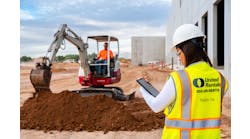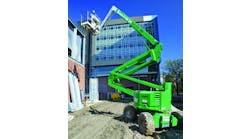This month's cover story is about incorporating environmental principles into rental center design. We didn't choose to present a cover story about environmental issues because we are “tree-huggers.” Neither do we look at this issue lightly while the rental industry is going through a fierce recession. We aren't doing it because we expect to save the planet, although we wouldn't mind playing a role in making it a safer place to breathe, eat, live and raise our kids, and I'd like us to be able to tell our kids we at least tried to make it better. And in this economy, in the rental business we have more immediate concerns, such as survival.
In this issue, Brandey Smith presents a look at what a few rental companies did to incorporate environmental principals into the design of their rental centers by utilizing basic sustainable operating practices. Granted RSC Equipment Rentals, and Caterpillar dealer/rental companies Cashman Equipment and Dean Machinery have capital that a small, independent rental center doesn't have. But one of the points of the article is that you don't have to do it on a grand scale, you can start small without a lot of capital investment and make changes that will save you money and make an environmental impact.
If you take the position you can't because you don't have the money to do what RSC, Cashman or Dean did, you are missing the point. You can start by studying ways to reduce energy use, use energy-saving light bulbs, cut down on paper, reduce waste, promote and practice recycling, install automatic motion light switches in offices and public areas, use low-VOC paints, install low-flow toilets or waterless urinals, replace windows with reflective or double-pane windows, use “cool-roof” technology for roof replacement, use waste oil for heating.
Start with small things and you'll still save money on energy consumption. Get your employees involved in coming up with ways to conserve energy. They'll feel good about themselves and the company. There are even some tax benefits to certain environmental efforts you can make.
Also, as environmental awareness continues to spread, people in your community will learn about your efforts. There will be customers who will prefer to do business with you because of your environmental commitment. I predict this way of thinking will become far more widespread in the coming years, just as more and more customers have become interested in documentation of commitment to safety on the part of rental companies they do business with.
Recovering from recessions involves making many different kinds of changes to make your company run more efficiently. This may be one of them.
There's no guilt trip coming here, no moralizing, no “it's the future of our planet,” or any other stock phrases. All we are saying is study it, consider it, but don't dismiss it.
Some people were surprised, some not, by the replacement of Cliff Miller as CEO of Sunbelt Rentals (See Industry News, page 18) and that he was replaced by somebody from outside the industry. In extraordinary times, sometimes outside-the-box steps need to be taken.
That's not to say that in the specific example of Sunbelt Rentals there aren't some fine qualified people among its senior management, such as Brendan Horgan and Charles Snyder. I don't know the inside reasons for the choice of Ashtead management, but there have been some effective executives in the rental industry who came from outside the industry.
As Ashtead chief Geoff Drabble said to me, Sunbelt has plenty of people at all levels that know the equipment rental industry, that know equipment, that know rental procedures. But sometimes, particularly in challenging economic times, different skills are called for. Sometimes it takes somebody from the outside to ask questions about why things are done a certain way? When Freek Nidjam came to RSC, for example, he asked a lot of questions about things that were commonly accepted as just the way things were always done. He asked, for example, why the company stocked rooms full of parts when they ended up ordering parts for most repairs anyway. He asked why the company continued to carry items that were unprofitable. He asked why it was OK to rent machines for substandard rates. He asked if there were ways to improve the design of a rental center, ways to use technology to improve delivery and lots more.
I'm not suggesting that bringing in someone from the outside always works. There are many examples where it didn't. But in tough times like these, keeping an open mind and asking hard questions is a good first step.





